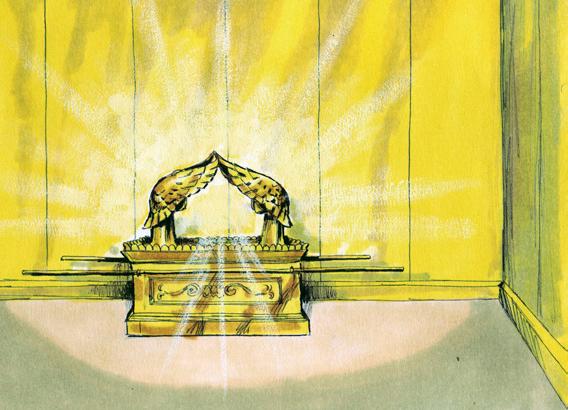Issue



Discern magazine (ISSN 2372-1995 [print]; ISSN 2372-2010 [online]) is published every two months by the Church of God, a Worldwide Association, as a service to readers of its LifeHopeandTruth.com website. Discern’s home page is LifeHopeandTruth.com/Discern. Free electronic subscriptions can be obtained at LifeHopeandTruth.com/ Discern. Contact us at info@DiscernMag.com
Postmaster: Send address changes to P.O. Box 3490, McKinney, TX 75070-8189
©2025 Church of God, a Worldwide Association, Inc. All rights reserved.
Publisher:
Church of God, a Worldwide Association, Inc., P.O. Box 3490, McKinney, TX 75070-8189; phone 972-521-7777; fax 972-521-7770; info@cogwa.org; LifeHopeandTruth.com; cogwa.org
Ministerial Board of Directors:
David Baker, Arnold Hampton, Mike Hanisko, Joel Meeker (chairman), Larry Salyer, Leon Walker and Lyle Welty
Staff:
President: Jim Franks; Editor: Clyde Kilough; Editorial content manager: Mike Bennett; Managing editor: David Hicks; Senior editor: David Treybig; Graphic designer: Elena Salyer; Associate editors: Erik Jones, Jeremy Lallier; Assistant editor: Kendrick Diaz; Copy editor: Becky Bennett; Social media: Hailey Willoughby
Doctrinal reviewers:
John Foster, Bruce Gore, Peter Hawkins, Don Henson, Doug Johnson, Chad Messerly, Larry Neff
The Church of God, a Worldwide Association, Inc. has congregations and ministers throughout the United States and many other countries. Visit cogwa.org/ congregations for information.
Donations to support Discern magazine and LifeHopeandTruth.com can be made online at LifeHopeandTruth.com/donate or by surface mail to Church of God, a Worldwide Association, Inc., P.O. Box 731480, Dallas, TX 75373-1480. The Church of God, a Worldwide Association, Inc. is organized and operated as a tax-exempt organization in the United States according to the requirements of IRS 501(c)(3). Contributions are gratefully acknowledged by receipt.
Unsolicited materials sent to Discern magazine will not be critiqued or returned. By submitting material, authors agree that their submissions become the property of the Church of God, a Worldwide Association, Inc. to use as it sees fit.
All Scripture quotations, unless otherwise indicated, are taken from the New King James Version (© 1982 by Thomas Nelson, Inc.). Used by permission. All rights reserved.
This publication is not to be sold. Free educational material.



While preparing His disciples for persecution, Jesus warned that “whoever denies Me before men” would be denied. What does it mean to deny Christ?
By Bill Palmer
Peter cursed and swore, vigorously denying for the third time any connection to Jesus. “Immediately a rooster crowed” (Matthew 26:74), triggering a memory of the prediction Jesus had made earlier in the evening (verse 34).
Peter may well have remembered another statement as well. Christ had warned the 12 disciples, “Whoever denies Me before men, him I will also deny before My Father who is in heaven” (Matthew 10:33).
No wonder Peter “went out and wept bitterly” after the rooster crowed (Matthew 26:75).
“Whoever denies Me before men” in context
When did Jesus offer this earlier warning, and why?
He did so as He prepared His core disciples to go “to the lost sheep of the house of Israel” (Matthew 10:6). Before the warning, Jesus told them to expect persecution along the way.
At the same time, He offered them comfort in the knowledge that God would inspire their very words

(verses 19-20). On top of that, Jesus spoke of God as “your Father” (verses 20, 29), emphasizing the love of the Father for the disciples.
They would need this reassurance to face future trials.
After this encouragement, though, Jesus uttered His stark warning. In it, He changed the reference from “your Father” to “My Father” (verses 32-33).
The implication is clear. Our relationship to the Father is contingent upon our relationship to Christ. We cannot call God our Father if we deny Christ.
For that reason, it’s vital for Christians to understand what denial means.
What we say—or don’t say—is important, but there is more to denying Christ than what we say. Denying Him can be as much about our actions as it is about our words.
This connection becomes clear when we examine another passage in Matthew’s Gospel that uses a more intensive form of the same Greek word for “deny.” This time the word is used about the requirement for disciples to deny themselves.
Once again, Jesus had been preparing His disciples for future persecution and suffering when He laid out the need for self-sacrifice in the Christian walk. “If anyone desires to come after Me, let him deny himself, and take up his cross, and follow Me” (Matthew 16:24).
Denying oneself is not merely a matter of words. The clear sense is that of being willing to deny one’s own hopes, desires, dreams and ambitions in order to follow Christ.
Years later, the apostle Paul addressed the flip side of this issue when writing to the church in Rome. He did not write about denying Christ, but confessing Him.
Paul wrote that “if you confess with your mouth the Lord Jesus and believe in your heart that God has raised Him from the dead, you will be saved” (Romans 10:9). Confessing in this passage, like denying in Matthew’s Gospel, means more than saying a few words.
The Greek word translated “confess” is homologeō. Vine’s Complete Expository Dictionary describes this sort of confession as “being the effect of deep conviction of facts.” What Paul was pointing out to the Romans was the need for a complete commitment, not simply a verbal affirmation.
Immediately before making his statement, Paul had been considering a passage from the book of Deuteronomy. That passage (Deuteronomy 30:11-14) explains that what God seeks is obedience from the heart, not mere lip service.
God even rebuked Israel for such insincere words: “These people draw near with their mouths and honor Me with their lips, but have removed their hearts far from Me” (Isaiah 29:13).
Recognizing the weakness of His people, God expressed this longing to Moses: “Oh, that they had such a heart in them that they would fear Me and always keep all My commandments, that it might be well with them and with their children forever!” (Deuteronomy 5:29).
Wholehearted dedication to God is a common theme throughout Scripture. It is what God has always desired from His children.
In the very next chapter of Deuteronomy, Moses confirms the need to put God first: “You shall love the Lord your God with all your heart, with all your soul, and with all your strength” (Deuteronomy 6:5).
Jesus repeated these words as the greatest commandment (Mark 12:29-30).
Many of the psalms speak of worshipping God with the whole heart (Psalm 119:2). Jeremiah records God’s charge that the nation of Judah, like Israel before it, had “not turned to Me with her whole heart, but in pretense” (Jeremiah 3:10).
In his epistle, the apostle James warned against being “double-minded” (James 4:8), another way of expressing a lack of dedication.
When Jesus warned His disciples against denying Him before men, He was reminding them that their words as well as their actions were to reflect a single-minded dedication to God.
It was a choice He put before those 12 disciples, just as Israel had been given the choice between “life and good, death and evil” (Deuteronomy 30:15). It is the same choice He puts before us today.
If a disciple is truly committed to following Christ, that individual will “take up his cross” (Matthew 16:24), enduring whatever is necessary to continue in a relationship with Christ and with the Father.
A disciple truly dedicated to following Christ will not deny Him.
How, then, could Peter deny Christ three times?
Peter truly did deny association with Jesus that terrifying night leading up to the crucifixion. It was a momentary lapse of courage and faith.
Just a short time before, however, Peter had drawn his sword to stand with Jesus against the soldiers who had been sent to arrest Him, even cutting off the ear of the high priest’s servant (John 18:10). Though Peter shouldn’t have resorted to violence, he did show courage in trying to protect his Master.
The Gospels make it clear that among the disciples there were only two swords (Luke 22:38). That was two
swords against “a detachment of troops” with their “weapons” (John 18:3).
Peter was prepared to fight alongside his Lord and Master. He was prepared to sacrifice, but he was not yet aware of the manner of sacrifice God desired.
He must have been stunned when Jesus told him, “Put your sword into the sheath. Shall I not drink the cup which My Father has given Me?” (verse 11).
Peter was confused, but he cared so much he followed Jesus to the courtyard of the high priest, putting himself among the relatives and fellow servants of the man whose ear he had cut off (verses 26-27)! Then, like all who follow Christ, Peter made a mistake. His three denials of Christ were during a moment of weakness, confusion and fear. His denials did not reflect what was truly in his heart.
Jesus knew Peter felt anguish and guilt. He had been there when the rooster crowed. He had “turned and looked at Peter” (Luke 22:61) at that precise moment.
Unlike Judas, Peter responded to his guilt with heartfelt repentance. Instead of giving up, he moved forward.
Christ did not allow Peter’s lapses to destroy their relationship. After His resurrection, Jesus singled Peter out to answer a question: “Simon, son of Jonah, do you love Me more than these?” (John 21:15).
Peter confirmed his love for Christ. Jesus responded by telling him to “feed My lambs,” then asked Peter a second time and a third time whether he loved Him (verses 16-17).
In each case, Peter said he did. In each case, Jesus told Peter to care for God’s people.
Peter had denied Christ three times the night before the crucifixion. Now Jesus gave him a chance to change his denial to confession. This threefold assertion of love for Christ was a moment of forgiveness and restoration.
The final words in this exchange are illuminating. Christ commanded Peter, “Follow Me” (verse 19). Action was necessary.
There’s no doubt that words are important. We should never allow ourselves to deny Christ with our mouths.
Equally important, though, we must remember that our words reflect what is in our hearts (Matthew 12:34). We can claim to confess allegiance to Christ but deny Him with a half-hearted approach to the Christian life. Remember, Jesus spoke of being willing to take up our own individual crosses, thus denying ourselves (Matthew 16:24).
It is impossible to put Christ first if we continue to put ourselves first. To decide for ourselves, without regard to God’s will, is to deny both Jesus and the Father, regardless of what we say.
What this means is that we must align our lives with God’s will. To do so, we must search Scripture to learn what God expects, and then we must strive to live “by every word that proceeds from the mouth of God” (Matthew 4:4).
So how do we avoid denying Christ before men? Here are a few examples of situations that require us to choose between denying or confessing Christ:
• You’re an accountant, and your boss is pressuring you to “fudge” the numbers. You can satisfy your boss, or you can do what you know to be right.
• You’re a teacher, and the school district is directing you to teach that homosexuality is a legitimate lifestyle when you know it is in opposition to the clear instruction of Scripture.
• You read an offensive post on social media. You can respond in anger, or you can calm down and move on.
Life is full of choices, and no one makes the right choice all the time. We are all sinners. In one way or another, we have all denied Christ.
While we remain in the flesh, we will have our moments of weakness and failure, just as Peter experienced. But we cannot remain in that state. We cannot continue to deny Christ, but must recommit ourselves, just as Jesus led Peter to do. And we can be encouraged by the way Jesus lovingly restored Peter’s relationship with Him.
Study more about what we can learn from Peter’s denial and repentance in our article “After Sin: Lessons From Judas and Peter.” D
Jesus Christ promises a new name to those who overcome. Why would Jesus give His followers new names? What can we learn from the new names in the Bible?
By Rod Williams
Jesus gives an unusual promise to those who overcome in Revelation 2:17:
“And I will give him a white stone, and on the stone a new name written which no one knows except him who receives it” (emphasis added throughout).
This secret new name is a very special gift God will personally give to each of His followers. What will our new name be? What can we learn from the way God changes names in the Bible?
From the first chapter of the Bible, God uses names to identify and explain. God introduces Himself not only by name (Elohim in Genesis 1:1) but also by what He has done. He is the God who created the heavens and earth.
God is incredibly creative. The vastness of the heavens tells us that God works on an unimaginable scale. This insight sparks new questions. Why did God create the universe? Is He still creating?
God unveils His names throughout the Bible to allow us to know Him better. The titles of God give insight

into His mind, nature and personality. With each name of God, we unravel vast mysteries.
Not only is God most powerful ( El Shaddai ), eternal ( El Olam) and exalted ( El Elyon), but He is also the God who heals sicknesses (YHWH Rapha), provides blessings (YHWH Jirah), brings righteousness (YHWH Tsidkenu) and champions peace (YHWH Shalom).
For a study of God’s names, see the article “ Names of God .”
God chooses names carefully. Just as God’s names for Himself have meaning, God’s chosen names for the creation have meaning.
Genesis 1:5 tells us, “God called the light Day, and the darkness He called Night.” God’s name for day means the hot or warm hours. God’s word for night means “a twist (away of the light),” because the earth turns away from the sun, becoming dark and colder. Giving names is part of God’s creation process. God names things what they are and what they do.

God conveys purpose through names. He wants us to understand His purpose for humanity.
God’s name for the first man was Adam (meaning ruddy or red earth) probably because he was formed from the dust of the ground (Genesis 2:7). The Hebrew word Adam is also God’s name for mankind (Genesis 5:2, King James Version). God also tells us we were created in the image of God (Genesis 1:26).
So God’s message to mankind is essentially: You are dirt now, but you are made in the likeness of God with great potential.
Creating Adam was only the first step in a much larger creation. Adam was formed of the dust in the likeness of God (Genesis 5:1) with the potential to be fully transformed into the bright likeness and glory of God (1 John 3:2).
King David was in awe of this larger plan. He wrote in Psalm 8:3-6:
“When I consider Your heavens, the work of Your fingers, the moon and the stars, which You have ordained, What is man that You are mindful of him, and the son of man that You visit him? For You have made him a little lower than the angels, and You have crowned him with glory and honor. You have
made him to have dominion over the works of Your hands; You have put all things under his feet.”
God gave man dominion, including allowing Adam to name the animals (Genesis 2:19). God plans to give man far more responsibility over His creation when the sons of God are revealed in their full glory (Romans 8:19-21).
But the creation of man is not finished. God continues to create the full stature of Christ in His followers (Ephesians 4:13). God refers to these followers as “called,” “chosen” and “faithful” (Revelation 17:14). God sees us as little children of God. His saints will grow to have a new heart like God’s (Psalm 51:10).
God even identifies Himself by the people He has transformed. God called Himself the God of Abraham, Isaac and Jacob, men who were transformed as they grew in spiritual maturity through decades of following God.
God began working with a man named Abram, calling him out of his homeland. Abram believed God and obeyed for many years. He was 99 when God renamed him—changing his name from Abram (meaning “exalted father”) to Abraham (meaning “father of a multitude” or “father of many nations,” Genesis 17:5).
Abraham pleased God and lived his faith by obeying God (Hebrews 11:8). Abraham became “the friend of God” over time as God worked with Him (James 2:23).
Abraham was destined to become the father of many nations. God names people what they will become. God declares the end from the beginning and has the power to bring His promises to pass (Isaiah 46:10). God changes names when purposes change.
Abraham was not the only one God renamed. Jacob, whose name meant “taking hold of the heel, supplanter, layer of snares,” was also renamed. At first, Jacob lived up to his name by shrewdly convincing Esau to sell his birthright for some stew and then plotting to steal his brother’s blessing.
But after years of trials and character growth, Jacob became a new person. After he wrestled with God, God changed his name to Israel, meaning “he prevails with God.”
God calls His followers children of God to express the close family relationship. This name also explains our enormous potential.
Notice 1 John 3:2: “Beloved, now we are children of God; and it has not yet been revealed what we shall be, but we know that when He is revealed, we shall be like Him, for we shall see Him as He is.”
God also gives names to those who turn away from the light of God. For example, a once powerful angel named Heylel, meaning “shining one” (Lucifer in Latin), fell into darkness when he rebelled against God (Isaiah 14:12-15). Lucifer became known as Satan, meaning “adversary,” because the devil opposes God and God’s people.
The devil is not the only one who opposes God. Even Peter, when he unwittingly opposed the plan of God, was called “Satan” or adversary (Matthew 16:23). The rebuke was strong, but Peter changed and that description did not stay with Peter.
Abraham, Isaac and Jacob learned to make good choices. Since they came to be known as followers of God, God even identified Himself as “the God of Abraham, of Isaac, and of Jacob” (Exodus 3:16).
Jezebel, Balaam and Judas had their names come to mean evil because of their bad choices. Modern names
like Hitler, Ponzi, Madoff and Dahmer are defined by the sins these infamous men committed.
God offers us eternal life and offers to call us “My son” if we overcome (Revelation 2:7; 21:7). Those who do not overcome will be known as “cowardly, unbelieving, abominable, murderers, sexually immoral, sorcerers, idolaters, and all liars,” and they do not have a future (Revelation 21:8). God calls those who demonstrate godly love “blessed,” and those who do not, “cursed” (Matthew 25:34, 41).
Perhaps the new names will reflect the positive characteristics of the overcomers.
Jesus Christ came to earth to show us the way to eternal life. He left earth to prepare a place for His followers (John 14:1-6). This place includes offices or positions of service. Learn more in our article “ Many Mansion (in Heaven?).”
For example, Jesus said the 12 apostles would sit on thrones judging the 12 tribes of Israel (Matthew 19:28). And John records that the foundations of the New Jerusalem will have the names of the 12 apostles (Revelation 21:14).
God, who is named “the Beginning and the End,” offers each person a choice. We can follow God by keeping His commandments or reject God and choose our own way. We can choose life or death. God wants us to choose life.
If we choose life and become overcomers, Jesus Christ promises to keep our names in the Book of Life and to confess our names before His Father and His angels (Revelation 3:5). He will write His new name on us (verse 12). And He will give us a new name chosen by God Himself (Revelation 2:17).
We may not know what that new name will be, but the promise should motivate us to become the person God is calling us to be. Our lifetime of spiritual growth, our conversion through the power of the Holy Spirit, and our faithful preparation for an eternity of love and service may be reflected in that carefully chosen name. Perhaps it will be related to our character and our new responsibilities as productive and fulfilled members of the family of God.
Whatever it will be, we can rejoice that our new name will signify our transformation into an eternal child of our loving God! D
“Strain at a gnat and swallow a camel” has become a colorful English idiom. What did it mean when Jesus first said it, and what should we learn?
By Mike Bennett
In the Holy Land in Jesus’ time, the camel was the largest animal around. Dromedary camels can be up to about 6.5 feet (2 meters) tall at the shoulder and weigh up to 1,325 pounds (600 kilograms).
Gnats were probably the smallest creatures that people were aware of. Quite a contrast!
The Cambridge Dictionary defines the idiom “strain at a gnat (and swallow a camel)” as: “To worry or think too much about something that is not important, often forgetting about something that is much more important.”
Context of Christ’s saying “strain out a gnat and swallow a camel”
Matthew 23 records Jesus’ powerful rebuke of the religious leaders during His last visit to Jerusalem, just a few days before His crucifixion. Throughout His ministry, many scribes and Pharisees were jealous of His influence and angered by His teaching. At His triumphal entrance to Jerusalem, the religious leaders were indignant (Matthew 21:15). When He came to the temple, they challenged His authority (verse 23).

“Then the Pharisees went and plotted how they might entangle Him in His talk” (Matthew 22:15). But they failed, as did the Sadducees with their trick questions (verses 23-34).
Matthew 23 contains Jesus’ warnings about the hypocrisy of the scribes and the Pharisees.
He proclaimed eight woes against the religious leaders. His fifth woe was, “Woe to you, scribes and Pharisees, hypocrites! For you pay tithe of mint and anise and cummin, and have neglected the weightier matters of the law: justice and mercy and faith. These you ought to have done, without leaving the others undone” (verse 23).
This is a reminder to all of us to look at things from God’s perspective and to weigh things as He weighs them. For a fuller look at this verse, see “God’s Priorities: The Weightier Matters of the Law.”
In this context, Jesus said, “Blind guides, who strain out a gnat and swallow a camel!” (verse 24).
As William Barclay says in his Daily Study Bible , “This is a humorous picture which must have raised a laugh, of a man carefully straining his wine through gauze to avoid swallowing a microscopic insect and yet cheerfully swallowing a camel. It is the picture of a man who has completely lost his sense of proportion.”
Of course, the scribes and Pharisees were not laughing. Jesus’ words surely stung the leaders and sealed His fate in their eyes. Soon after, “the chief priests, the scribes, and the elders of the people assembled at the palace of the high priest, who was called Caiaphas, and plotted to take Jesus by trickery and kill Him” (Matthew 26:3-4).
Though Jesus knew what was coming, He did not hold back, but powerfully taught God’s priorities.
emphasis of “strain out a gnat and swallow a camel”
K.J. Went commented:
“Jesus was not criticising their gnat-straining but their inadvertent camel-swallowing. Just as, according to the
previous verse (v23), they tithed mint and cumin, and left judgement, mercy and faith, to fend for themselves, so they should have ensured that they strained all unclean bodies from their drinks including the camels. ‘These you ought to have done, without leaving the others undone’ (Matthew 23:23, NKJV).
“The criticism of the Pharisees was not about what they said, but what they chose to do. Their hypocrisy was to teach well and then not do accordingly, or to concentrate on one aspect of law to the detriment of the practice of another ‘weightier’ part” (StudyLight.org ).
Such surprising and humorous sayings can be an effective teaching tool, and Jesus was history’s greatest teacher.
The mental image of a giant camel and a tiny insect probably stuck with everyone who heard Him that day. It got their attention, was spoken authoritatively and gave them something to think about.
Learn more about Jesus’ teaching methods in the article “Jesus the Teacher: How Did Jesus Teach? ”
Some commentators note that “strain out a gnat and swallow a camel” is hyperbole—an exaggeration for effect. No one can actually swallow an entire camel!
But another way to look at this teaching is to consider that the misplaced spiritual priorities Jesus was really talking about may be even more dramatic than the word picture He used. It’s possible that the spiritual reality was not an exaggeration, but an understatement!
So we should carefully consider our choices and priorities. Are we, as the saying goes, “majoring in the minors”? Are we missing the forest for the trees? Are we penny-wise and pound-foolish?
Are we straining out a gnat, but gulping down a camel?
Study this important subject further in our articles “Christian Priorities: Putting God First ” and “God’s Priorities: The Weightier Matters of the Law.” D
Have movies and television distorted our perception of the biblical Ark of the Covenant? What was it, and what does the ark represent?
By Bill Palmer

The camera closes in on the government agents. One looks around nervously to be sure no one else is listening. The fictional conversation turns to the Ark of the Covenant.
“The Bible speaks of the ark leveling mountains and laying waste to entire regions,” a somber voice discloses. “An army which carries the ark before it is invincible.”
These are the words of a fictional character, the mentor of Indiana Jones, near the beginning of the 1981 blockbuster movie Raiders of the Lost Ark . Are they true? Did the ark level mountains and make armies invincible? What was it anyway, and what does the Ark of the Covenant represent?
What was the Ark of the Covenant?
The English word ark is a translation of the Hebrew 'ārôn, which can mean “coffin” (Genesis 50:26), or simply a “chest” or “box” (2 Kings 12:9). In most cases in Scripture, however, the word refers to the Ark of the Covenant.
The New King James Version of the Bible uses “ark of the covenant” 43 times, but also refers to the same object as the “ark of the Testimony” 13 times (Exodus 25:16, 21).
Both terms connect the ark with God’s law.
Scripture tells us that the ark did function as a chest or box. God commanded Moses to place the stone tablets engraved with the 10 Commandments into the ark (Deuteronomy 10:2-5).
At one time, the ark also possibly contained a pot of manna, as well as Aaron’s rod. The book of Hebrews mentions all three items (Hebrews 9:4).
Some scholars believe the manna and Aaron’s rod were only “before” (or in front of) the ark rather than within it. The wording in Exodus 16:33-34 and Numbers 17:10-11 might seem to support this conclusion. However, the actual wording is “before the Testimony” (both passages) and “before the Lord” (Exodus only).
Scripture does not tell us what happened to the manna and Aaron’s rod, but by the time King Solomon had the ark moved into the temple he had just completed, the ark contained only the 10 Commandments (1 Kings 8:9).
By stating that “nothing was in the ark except the two
tablets of stone,” this passage seems to hint that other items might have been expected, but were missing.
The people of Israel built the Ark of the Covenant according to explicit instructions Moses received directly from God at Mount Sinai (Exodus 25:10-22). They had affirmed their commitment to obey the terms of the covenant (Exodus 24:7), after which God commanded Moses to meet Him at the top of the mountain (verse 12).
Moses returned from the mountain 40 days later (verse 18) with the charge to construct a sanctuary (Exodus 25:8) as well as to make the Ark of the Covenant (verse 10).
God’s instructions regarding the ark (verses 1022) specify the wood to be used, the dimensions, the features and the purpose of the ark. In addition, God gave Israel’s artisans, particularly Bezalel and Aholiab, a special “wisdom” through His Holy Spirit to complete this important work (Exodus 31:2-6).
The craftsmen finished their work on the tabernacle and the ark by the beginning of the second year after Israel left Egypt (Exodus 39:32-35; 40:17).
God began to specify the purpose for the ark in the initial instructions He gave Moses. In reference to the Ark of the Covenant, God said, “And there I will meet with you” (Exodus 25:22; 30:6).
As the place where God would meet with Moses, the Ark of the Covenant represented the presence of God among His people. That is why it was placed behind the veil separating “the holy place and the Most Holy” in the tabernacle (Exodus 26:33).
The tabernacle itself, and later the temple, signified God’s presence and character. God is holy and can be approached only by a people made holy (Leviticus 19:2).
The “Most Holy” behind the veil was reserved for God, and it is fitting that this was the very place where the ark was kept. To stand “before the ark,” according
to the Zondervan Pictorial Encyclopedia of the Bible , was to stand before God.
This sense of God’s presence is highlighted by the description of Israel’s travels through the wilderness after leaving Mount Sinai (Numbers 10:33-34). Both the ark and the pillar of cloud signified God’s presence with His people, and both are mentioned in this passage.
The following verses record the substance of the prayers Moses offered as the ark set out on a journey and as it rested.
As the ark left, Moses said: “Rise up, O Lord! Let Your enemies be scattered, and let those who hate You flee before You” (verse 35).
When the ark rested, Moses said: “Return, O Lord, to the many thousands of Israel” (verse 36).
Clearly, the Ark of the Covenant represented the presence of God with Israel. It was not, however, a guarantee of His presence or an idol to worship. It was a reminder of God’s covenant that made a relationship with Him possible.
The ancient Israelites wanted to know that God was with them.
This was especially true as they were poised to cross the Jordan River and enter the Promised Land. After spending 40 years in the wilderness, the Israelites would finally receive the homeland for which they had yearned.
The previous generation, their parents, had feared the inhabitants of the land of Canaan more than they had trusted God (Numbers 13:28-29, 31-33). They had refused to enter the land and, as a result, had wandered in the wilderness for 40 years (Numbers 14:26-35).
Most of those set to cross the Jordan River hadn’t been born when God divided the water of the Red Sea (Exodus 14). However, God performed a similar miracle at the Jordan. The Ark of the Covenant played an important role.
Israel saw that “the waters of the Jordan were cut off before the ark of the covenant of the Lord” (Joshua 4:7).
It was not the ark itself, but God who made this crossing possible. Joshua told the people that “the Lord your God dried up the waters of the Jordan” (verse 23).
Just as their parents had witnessed the destruction of the Egyptian army at the Red Sea, this new generation needed assurance to face their enemies. That assurance came with the first battle in the Promised Land, and the ark was pivotal.
Jericho’s walls would have been an intimidating sight. God directed His people to use the ark in a dramatic way. They were to march around the city with the ark one time each day for six days while priests blew trumpets made from ram’s horns (Joshua 6:3-4). On the seventh day, they were to march around Jericho seven times.
Having the Ark of the Covenant displayed so prominently would have signified God’s presence with His people. They would not even see battle until the walls collapsed as God promised (verse 5).
This victory at Jericho set the stage for the conquest of the land of Canaan that followed. There were setbacks at times because of sin (Joshua 7), but for the most part, Israel enjoyed victory after victory.
The Bible does not speak of the ark being used in battle again until late in the period of the judges. In fact, “the ark’s use in battle seems to have been exceptional” (Zondervan, Vol. 1, p. 307).
This fact alone is enough to tell us that the ark was not some superweapon, as depicted in Raiders of the Lost Ark . Rather, it was a symbol of the presence and power of God, and try as they might, human beings could not manipulate that power.
Israel learned this lesson the hard way. After a humiliating defeat at the hands of the Philistines (1 Samuel 4:2), the tribal elders suggested that the presence of the ark would turn the tide of battle: “Let us bring the ark of the covenant of the Lord from Shiloh to us, that when it comes among us it may save us from the hand of our enemies” (verse 3).
The result was not what Israel expected. The Philistines slaughtered 30,000 foot soldiers (verse 10), far more than the 4,000 lost in the preceding battle (verse 2).
Even more shocking was what happened to the ark, the very symbol of God’s presence. God allowed the Philistine army to capture it (verse 11)!
The Philistines themselves learned that the ark was not some trophy to be displayed. The idol of their god Dagon ended up broken to pieces before the ark (1 Samuel 5:4). Worse, their people suffered plagues (verse 6) until they returned the ark to Israel (1 Samuel 6).
The ark was a material object without any inherent power. Even so, God demanded that it be treated with respect. The Ark of the Covenant represented God, though it was never to be an object of worship.
Among all the items associated with the tabernacle and temple, the ark “was, in many respects, the most important object of all” (The New Manners and Customs of Bible Times, p. 369).
The ark was not to be transported by cart or wagon, but by men holding onto poles designed to fit through rings on the ark (Exodus 25:12-15).
God stipulated that only men from the family of Kohath, one of three branches of the tribe of Levi (Numbers 3:17), were to carry the ark and only after the ark had been covered by priests (Numbers 4:5-6, 15).
Years later, when King David sent men to transport the ark to Jerusalem, they seemed to be unaware of God’s instructions in the books of Moses. These men transported the ark on an ox cart (2 Samuel 6:3).
The fact that the cart was new indicates that these men intended to be respectful. Unfortunately, they did not search Scripture to determine God’s will in the matter. As a result, a man died.
Uzzah, seeing that the oxen had stumbled, at one point reached out his hand to steady the ark (verse 6). This action, though presumably well-intentioned, violated God’s distinct instructions not to touch the ark. God struck Uzzah down (verse 7).
Note that the Bible tells us it was God, not the ark, who struck Uzzah down. The Ark of the Covenant, though
it represented the all-powerful and holy God, had no power of its own. Find more answers about this incident in the article “ Uzzah and the Ark: Was God Unfair? ”
The ark was still in Jerusalem in the time of King Josiah (2 Chronicles 35:3). He reigned just a few decades before the Babylonian invasion and the destruction of Jerusalem.
The biblical record tells us that Nebuchadnezzar, the king of Babylon, took “all the articles from the house of God, great and small, the treasures of the house of the Lord” (2 Chronicles 36:18).
This statement does not specify that the Ark of the Covenant was among those treasures. However, most scholars believe it was after this that the ark was lost.
The first-century historian Josephus tells us that during the Roman period, the ark was not within the second temple:
“But the inmost part of the temple of all was of twenty cubits. This was also separated from the outer part by a veil. In this there was nothing at all. It was inaccessible and inviolable, and not to be seen by any; and was called the Holy of Holies” (The Wars of the Jews, Book 5, sec. 215, emphasis added).
The Ark of the Covenant has captured the imagination of many people through the centuries. That’s undoubtedly why the History Channel’s History’s Greatest Mysteries proclaimed the ark to be “one of the holiest and most powerful relics from the Bible.”
The ark was indeed holy, in the sense that it was set apart by God to represent His presence, but it had no power of its own. It was only a symbol of an important truth:
God intends to dwell among humans.
Ultimately, there will no longer be a need for an ark to represent God. People will no longer be fascinated by it, because God Himself will dwell among His children. The prophet Jeremiah wrote of this wonderful time to come:
“‘Then it shall come to pass, when you are multiplied and increased in the land in those days,’ says the Lord, ‘that they will say no more, “The ark of the covenant of the Lord.” It shall not come to mind, nor shall they remember it, nor shall they visit it, nor shall it be made anymore’” (Jeremiah 3:16). D
What has God revealed, and what has He kept secret? The answers might surprise you. He has revealed much more than most realize.
By Mike Bennett
The first part of Deuteronomy 29:29 is intriguing: “The secret things belong to the Lord our God.”
What are those secret things? Why are they secret? Will we ever be able to understand those secrets?
God created us with curiosity, and He knew humans would be drawn toward mysteries and fascinated by hidden things.
But that first part really isn’t the main point of Deuteronomy 29:29. Consider the contrast in the rest of the verse:
“But those things which are revealed belong to us and to our children forever, that we may do all the words of this law.”
While the Bible does mention secrets and mysteries, it’s really about what God has revealed—what He wants us to know and why it is so important.
As we will see, God has revealed much more than most people realize. He has revealed everything we need to know—and a lot of things we want to know.
God’s religion has some mysteries, but it isn’t a mystery religion. Moses noted that God’s law “is not

too mysterious for you, nor is it far off” (Deuteronomy 30:11). Paul quoted from this section and found comfort that God’s message of salvation is not inaccessible but near (Romans 10:6-9). We can believe it and express it.
Though many are currently blinded to the revelation in the Bible, that is not because it is written in secret code or requires mystical knowledge not contained in Scripture.
God gave the Bible to make His truth plain.
The Bible isn’t written in the format of an encyclopedia or a “frequently asked questions” page, but when studied carefully, it can serve as an instruction book for God’s human creation.
Here are some of the essential things God reveals in the Bible (along with helpful related resources):
• How to live a fulfilling life (see “ Life More Abundantly ”).
• How to be saved—to receive eternal life (see “ How to Be Saved ”).
• How to please God (see “How to Please God ”).
• What God promises (see “God’s Promises: Rock-Solid Hope and Assurance ”).
• The outline of future events (see How to Understand Prophecy).
Prophecy is one area of God’s revelation that has been of great interest, speculation and confusion.
The Bible tells us, “Surely the Lord God does nothing, unless He reveals His secret to His servants the prophets” (Amos 3:7).
But that doesn’t mean that every detail of prophecy was understood by the prophets themselves or will be understood by God’s people before the time the information is needed.
For example, when Daniel did not understand a prophecy given to him, he was told, “Go your way, Daniel, for the words are closed up and sealed till the time of the end” (Daniel 12:9). Even then, “none of the wicked shall understand, but the wise shall understand” (verse 10).
Peter noted that to the Old Testament prophets “it was revealed that, not to themselves, but to us they were ministering the things which now have been reported to you through those who have preached the gospel to you by the Holy Spirit sent from heaven—things which angels desire to look into” (1 Peter 1:12).
So clearly there are things revealed in the Bible that not everyone can understand—yet. Still, God gives us everything we need.
The apostle Paul wrote to Timothy about the purpose of the Bible and the benefits we gain from studying it.
“All Scripture is given by inspiration of God, and is profitable for doctrine, for reproof, for correction, for instruction in righteousness, that the man of God may be complete, thoroughly equipped for every good work” (2 Timothy 3:16-17).
God has recorded and preserved for us everything we need to become spiritually mature. Regularly studied and rightly understood, Scripture prepares us to become more and more like our loving Father in every aspect of life.
God’s instructions are given for our benefit: “You shall therefore keep His statutes and His commandments . . . that it may go well with you and with your children after you” (Deuteronomy 4:40; see also 10:13).
The Bible guides us: “Your word is a lamp to my feet and a light to my path” (Psalm 119:105).
God’s instructions provide guardrails and rewards: “Moreover by them Your servant is warned, and in keeping them there is great reward” (Psalm 19:11).
For more on this, see the articles in our section “ The Practical and Priceless Benefits of Bible Study.”
But what about the scriptures that talk about mysteries, hidden wisdom and the general blindness of people to God’s truth? (See “Spiritual Blindness and Spiritual Veils.”)
Though God’s revelation is not written in secret code, the Bible does tell us there are reasons most people don’t understand much of it.
One reason is that most ignore it or only give it a passing glance. These ancient books can certainly be daunting to modern readers. If people don’t see the relevance of the Bible, they won’t give it the focused attention and study it requires.
Another reason is that many people aren’t willing to believe it or do what it says. God tells us, “A good understanding have all those who do His commandments” (Psalm 111:10). The implication is that those who do not obey will not have a good understanding.
The Bible tells us that behind these and other pitfalls to understanding is an evil spirit who doesn’t want us to know God’s wonderful plan for us.
The apostle Paul explained, “But even if our gospel is veiled, it is veiled to those who are perishing, whose minds the god of this age has blinded, who do not believe, lest the light of the gospel of the glory of Christ, who is the image of God, should shine on them” (2 Corinthians 4:3-4).
The Bible also tells us Satan has actually deceived the whole world (Revelation 12:9).
This deception keeps people from the most important key to understanding: the gift of God’s Holy Spirit.
Paul wrote, “The natural man does not receive the things of the Spirit of God, for they are foolishness to him; nor can he know them, because they are spiritually discerned” (1 Corinthians 2:14).
There are things the human mind can’t comprehend. However, God has a plan to remove the deception and blindness through offering His Holy Spirit to each person according to His perfect timing.
Paul also wrote, “‘Eye has not seen, nor ear heard, nor have entered into the heart of man the things which God has prepared for those who love Him.’ But
God has revealed them to us through His Spirit. For the Spirit searches all things, yes, the deep things of God” (verses 9-10).
What does the Bible say about how we receive the Holy Spirit and how we know we have it? See our article “How Do You Know You Have the Holy Spirit? ”
God has revealed everything we need to know, and even some of the deep things of God, yet there are still “secret things” of God. These include:
• Specific prophetic timing that we can’t know yet. For example, Jesus said of His return, “But of that day and hour no one knows, not even the angels of heaven, but My Father only” (Matthew 24:36; see “ When Will Jesus Return? ”).
• Things beyond our comprehension. Even with access to God’s Holy Spirit, we can only begin to think like God on the spiritual plane. God said, “‘For My thoughts are not your thoughts, nor are your ways My ways,’ says the Lord. ‘For as the heavens are higher than the earth, so are My ways higher than your ways, and My thoughts than your thoughts’” (Isaiah 55:8-9).
God does want to close that gap. He wants us through diligent Bible study and committed practice to learn to think and act more like Him day by day. How can we do this?
• Allow God to write His laws on our hearts and minds (Hebrews 8:10).
• Use His Spirit to bring “every thought into captivity to the obedience of Christ” (2 Corinthians 10:5).
• Seek to not be conformed to the selfish and evil ways of this world, but to be “transformed by the renewing” of our minds (Romans 12:2).
• Strive to live “by every word that proceeds from the mouth of God” (Matthew 4:4).
By doing so, we fulfill His purpose for our lives—to become His children!
“Beloved, now we are children of God; and it has not yet been revealed what we shall be, but we know that when He is revealed, we shall be like Him, for we shall see Him as He is” (1 John 3:2).
What God has revealed and will reveal is so incredible, so inspiring, so awesome, that it is beyond human comprehension! But it can belong to us forever! Study this further in our booklet God’s Purpose for You: Discovering Why You Were Born . D
Many ancient religions were mystery religions.
According to World History Encyclopedia, “Mystery cults, or mystery religions, were ancient religious associations characterized by secrecy and initiation rites . . . Members of mystery cults were required to maintain the secrecy of the cult’s rituals and knowledge, which added to the cult’s prestige.”
The religion of the Bible, however, did not involve secret rituals. Even ceremonies restricted to members or priests or the high priest are explained in the Bible for all to read.
For example, even though only the high priest could enter the holiest part of the temple, and then only once a year, what he was to do and what
he would see there is all described in the Old and New Testaments (Exodus 30:10; Leviticus 16:2-34; Hebrews 9:1-7).
And not only that, but the Bible tells us what it all means. This annual ceremony represented Jesus Christ’s sacrifice to pay the penalty of our sins, so we can inherit eternal life as children of God! (See Hebrews 9:8-15; 2:10; “ The Day of Atonement: Removing the Enemy, Reconciling All to God.”)
The Bible warns about mystery religion (Revelation 17:5; “ Mystery, Babylon the Great ”).
Instead, we are to seek “the simplicity that is in Christ” (2 Corinthians 11:3; see “Christianity Made Simple”).

